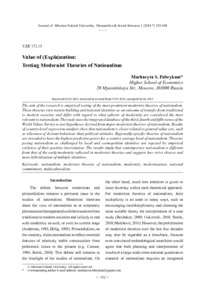Value of (Expla)nation: Testing Modernist Theories of Nationalism
Скачать файл:
URI (для ссылок/цитирований):
https://elib.sfu-kras.ru/handle/2311/10190Автор:
Fabrykant, Marharyta S.
Фабрикант, М.С.
Дата:
2014-01Аннотация:
The aim of the research is empirical testing of the most prominent modernist theories of nationalism.
These theories view nation-building and national identities as an outcome of transfer from traditional
to modern societies and differ with regard to what spheres of modernity are considered the most
relevant to nationalism. The study uses the integrated database of the third, fourth and fifth waves of the
World Values Survey to test hypotheses derived from major modernist theories of nationalism. Results
of country-level regression analysis show that nationalism is closer related to general value sets, such
as tolerance of deviant behaviour than political attitudes. Regionally specific theories of nationalism
are revealed to have the highest predictive power for a country average level of nationalism. Theories
posing nationalism as challenged by local and cosmopolitan identities are rejected by empirical
evidence of their positive interrelation. The results imply that contemporary nationalism is different
from that of the early modernity reflected in modernist theories and suggests less strict choices and
more hybridization of multiple identities Цель исследования – эмпирическая проверка ключевых модернистских теорий национализма.
Данные теории рассматривают нациестроительство и национальную идентичность как
результат перехода от традиционных обществ к современным и предлагают различные
версии того, какую из сфер модернити следует считать наиболее релевантной национализму.
В исследовании используется интегрированная база данных третьей, четвертой и пятой
волн Всемирного исследования ценностей для проверки гипотез, выдвинутых на основании
модернистских теорий национализма. Результаты регрессионного анализа на страновом
уровне указывают на то, что национализм сильнее связан с общими ценностями наподобие
религиозности, чем с политическими убеждениями. Регионально специфические теории
национализма демонстрируют наибольшую предсказательную силу для среднестранового
уровня национализма. Теории, представляющие национализм как вытесняемый локальными
и космополитическими идентичностями, не подтверждаются эмпирическими данными,
которые свидетельствуют о положительной взаимосвязи этих типов идентичностей.
Результаты исследования позволяют сделать вывод о том, что современный национализм
отличается от национализма времен ранней модернити, отраженных в модернистских
теориях национализма, поскольку предполагает меньше ситуаций жесткого выбора и больше
возможностей для гибридизации и множественных идентичностей
Коллекции:
Метаданные:
Показать полную информациюСвязанные материалы
Показаны похожие ресурсы по названию, автору или тематике.
-
Current Systems of Protected Areas Integrated with Urban Agglomerations
Безруких, В. А.; Kuznetsova, O. A.; Лигаёва, Т. А.; Макарова, Л. Г. (2019-02)Abstract. The article considers current systems of national parks and reserves mutually integrated with urbanized territories located in close proximity to cities: the “Stolby” natural reserve near the city of Krasnoyarsk, ... -
Soviet Nationalities Policy of the 1960s – early 1980s
Podyapolskiy, Sergey A.; Подъяпольский, С.А. (Сибирский федеральный университет. Siberian Federal University, 2016-04)The analyzed period was characterized by a combination of three factors. The first of them is a controversial and largely unfavorable dynamics of socio-demographic and ethno-cultural processes. This refers to the uneven ... -
Value of (Expla)nation: Testing Modernist Theories of Nationalism
Fabrykant, Marharyta S.; Фабрикант, М.С. (Сибирский федеральный университет. Siberian Federal University., 2013-11)The aim of the research is empirical testing of the most prominent modernist theories of nationalism. These theories view nation-building and national identities as an outcome of transfer from traditional to modern ... -
Нациестроительство на территории Эвенкийского и Таймырского национальных округов в 1920–1970-е гг.: культурные и художественные практики
Пчелкина, Д. С.; Пименова, Н. Н.; Замараева, Ю. С.; Дегтяренко, К. А.; Тимошкин, Д. О.; Pchelkina, Daria. S.; Pimenova, Natalya N.; Zamaraeva, Yulia S.; Degtyarenko, Ksenia A.; Timoshkin, Dmitrii O. (Сибирский федеральный университет. Siberian Federal University, 2022-10)Особенная роль в нациестроительстве округов Советского Севера занимает феномен культбазы как одного из ведущих акторов культуры на отдаленных территориях, являющихся местами компактного проживания коренных малочисленных народов ... -
National Images of Countries in Intercultural Interaction of World Civilizations in Modern Period
Borisenko, Irina; Grigoryeva, Gyulmira; Борисенко, И.; Григорьева, Г. (Сибирский федеральный университет. Siberian Federal University., 2015-09)The formation of the national identity is determined by the process of comparing “yourself” with “the other”. The feeling of the national identity is fixing the differences “our – strangers”, “ours – not ours”. When the ...

